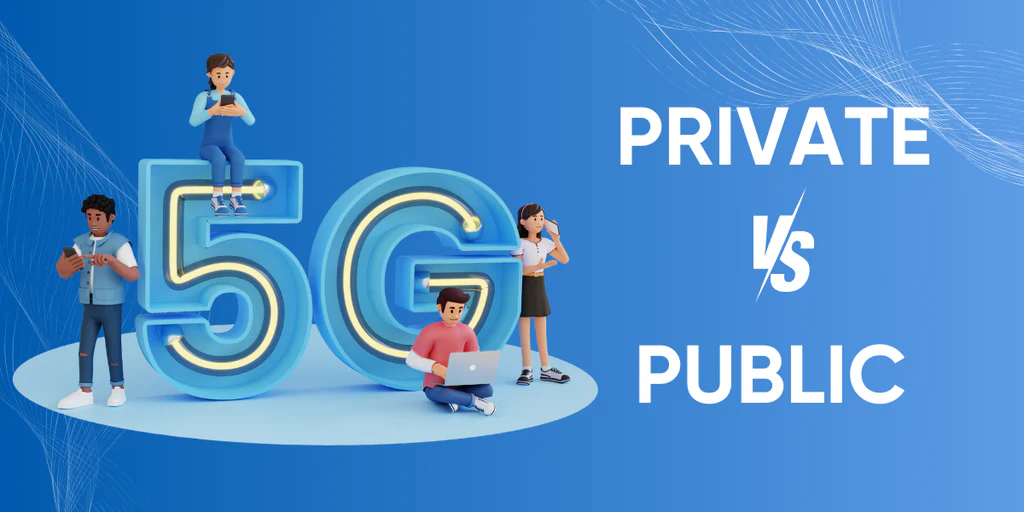
Most people today are familiar with 5G networks. They know it’s faster than 3G, 4G, and LTE because it came later and must be an improvement. 5G is the fifth-generation wireless technology, offering speeds up to 100 times faster than 4G LTE, along with benefits like extensive coverage, ultra-low latency, and critical reliability. However, many users are not aware of what a Private 5G network is.
A Private 5G network is a dedicated 5G network set up by an organization for its own use. Instead of depending on a public mobile network operator, the organization manages its own private network. This setup allows businesses, government agencies, and other entities to have more control, security, and customization of their wireless communication infrastructure. While this may seem straightforward, let's delve into the key components and aspects of Private 5G to understand it better.
Private 5G networks can use licensed, unlicensed, or shared spectrum bands based on regulatory rules and organizational needs.
A shared spectrum band is a portion of the radio frequency spectrum that multiple users or entities can access under regulatory guidelines. Unlike licensed spectrum, which is exclusively reserved for specific operators or organizations, and unlicensed spectrum, which anyone can use within certain technical limits, shared spectrum bands strike a balance between exclusivity and accessibility.
Licensed spectrum provides exclusive use and protection from interference but requires a license from regulatory authorities. Unlicensed spectrum, like the 5 GHz band, offers flexibility but can be affected by interference from other devices. Shared spectrum, such as the Citizens Broadband Radio Service (CBRS) in the United States, combines features of both licensed and unlicensed spectrum. It allows dynamic access to spectrum resources, enabling users to utilize a portion of the licensed spectrum exclusively for their network when needed.
Security is vital for private 5G networks, especially in sectors like healthcare, finance, manufacturing, and government, where sensitive data and operations are involved. Organizations need strong security measures to protect against cyber threats, unauthorized access, and data breaches. These measures include encryption, authentication, access control, intrusion detection, and security monitoring.
Private 5G networks offer a more secure and private environment with greater control over data privacy. They ensure compliance with regulatory requirements, giving users full visibility and ownership of their network infrastructure.
Private 5G and Public 5G networks use the same basic technology and capabilities, but they differ in how they are deployed, managed, and used. Private 5G networks often provide faster speeds than public 5G networks, along with better efficiency, reliability, and capacity because they serve more specific, targeted purposes. Private 5G can cover areas spanning hundreds of square miles, with speeds ranging from 30 to 250 Mbps. On the other hand, Public 5G networks can get congested during peak times, resulting in slower speeds. Here is a breakdown of the main differences between the two types of networks:
|
|
Private 5G |
Public 5G |
| Underlying Technology | Same as Private 5G | Same as Public 5G |
|
Ownership & Control |
Owned, operated, & controlled by a single organization or entity |
Typically owned & operated by telecommunications companies or mobile network operators (MNOs) |
|
Coverage & Deployment |
Deployed within a tailored specific geographic area
|
Deployed across wide geographic regions to provide wide public coverage
|
|
Security & Privacy |
User fully controls all data with security measures using
|
Protect user data & communications depending on
|
|
Customization & Optimization |
Offers organizations the flexibility to customize network
|
Provides standardized services and offerings to a broad range of users and devices |
|
Use Cases & Applications |
Suited for a wide range of cases across different industries
|
Supports diverse user cases for consumer and enterprise applications in both urban and rural environments. |
Private 5G networks are built much like public 5G networks, using components such as small cells, base stations, and main network parts. However, these private networks are tailored to meet the specific needs of an organization, including coverage, capacity, and speed. They can handle different types of services like high-speed internet access (enhanced mobile broadband or eMBB), connections for many devices (massive machine-type communications or mMTC), and very reliable, quick communications (ultra-reliable low-latency communications or URLLC).
There are several ways an organization can set up a private 5G network. They can choose to have all the equipment on their own property (on-premises), which allows them to control the network closely and reduce delays in data transmission. Alternatively, they can use cloud-based solutions that manage the 5G services through virtual network functions and advanced network technologies from central data centers or cloud platforms, which adds scalability and flexibility. Some organizations opt for a hybrid approach, combining on-premises and cloud-based elements to get the best balance of performance, cost, and ease of management.
What Are The Factors For Choosing Private 5G or 5G?
What makes an organization choose Private 5G over Public 5G? The decision often comes down to four key factors: security, privacy, customization, and integration.
Private 5G networks often perform better and can handle more data than traditional Wi-Fi networks. They support extremely fast response times, high data transfer rates, and can connect many devices at once. This makes 5G ideal for places with lots of devices or for use with advanced technologies like augmented reality (AR), virtual reality (VR), and real-time video streaming, providing a smoother and more efficient experience.
However, it's important to remember that Wi-Fi also has its advantages. It's widely used, works well with many devices, and is generally more cost-effective, especially for indoor and personal use. In many cases, Wi-Fi and 5G will likely be used together, each playing a role that suits different needs, situations, and preferences. Whether to use Wi-Fi or 5G depends on what you need from your network.
Private 5G networks offer numerous benefits for different industries thanks to their fast communication, high reliability, and ability to connect many devices. Here are some ways industries use private 5G: